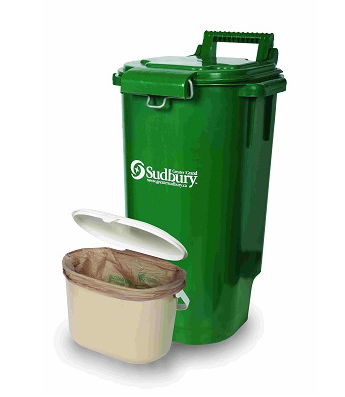THUNDER BAY — The City of Thunder Bay will have to come up with money to pay for collecting and recycling food and organic waste that's currently being buried at the landfill site.
Ontario's Food and Organic Waste Policy Statement requires Northern Ontario municipalities with populations greater than 50,000 to recover 50 per cent of food waste generated by single-family dwellings by 2025.
In the rest of the province, the objective is 70 per cent, and the program must be in place by 2023.
Jason Sherband, manager of solid waste and recycling services for the city, says covering the operating and capital expenses of a curbside collection program will be the biggest challenge.
"You need to collect it, you need to process it, and so obviously there's costs and significant startup costs, absolutely...Organics programs are typically one of your most expensive waste streams to manage," Sherband told Tbnewswatch.
The costs have not been calculated yet.
Sherband said he hopes there will be some financial help from the province.
"Currently we're not seeing that, but that's part of the advocacy work between now and when we've gotta roll this out."
The other big issue for Sherband and his staff is the logistics.
"How do we integrate that into our system? Because it is going to affect how we collect other waste streams. How we integrate is one of the first exercises that we have to do, and will be doing soon," he said, adding that this will also give the city a better sense of what the program might cost.
Currently, over 60 per cent of Ontario's food waste ends up in the landfill, despite the fact over 90 communities operate green bin programs.
In Northern Ontario, the only municipality already recycling food that householders leave in city-supplied bins at the curb is Greater Sudbury. The material is turned into compost.
Food waste dumped in a landfill creates methane, which the province says is 28 times more potent as a greenhouse gas than carbon dioxide.
At the Mapleward Road landfill site, a generating station owned by Synergy North generates up to 3,200 kilowatts of electricity, using methane gas produced by decaying garbage.
Sherband said there may be a way "to help leverage or support that operation to meet the needs of the policy statement. It leaves the door open when I talk about how best we integrate. We've got to do the best for the city and the taxpayers at large."
He said COVID-19 has caused some delays, but he hopes to submit a preliminary report to city council next year.
"Council's certainly aware that this program is coming, that there is an obligation and that we have to comply."
He expects that once the program gets underway, there will be a mixed response from the public.
Sherband said he believes many Thunder Bay residents have wanted a green bin program for a long time, but some may still require persuading.
"It's what they call the 'yuk' factor, right? You're dealing with food waste...You always have the keeners who who will jump on board right away. It's gonna take some time to get other people on board and willing to participate."
